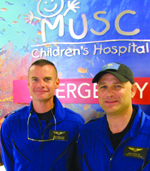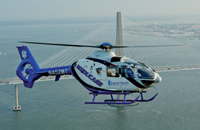|
By Dawn
Brazell
Public Relations
Accidents
happen. All the time. No one knows
that better than the two
blue-suited flight nurses in front
of me describing the pediatric
emergency calls they respond to
daily by boarding an aircraft or
"rolling out."
 Craig Duncan and Mark
Daniell, both registered nurses
and part of MUSC's Pediatric
Critical Care Transport Team, have
seen it all. They and their fellow
crew members train constantly,
including surviving a simulation
of being dunked upside down in a
water tank. The drills make sure
they're ready to administer
emergency care anywhere, trained
so well they can function on
auto-pilot, and in cramped spaces. Craig Duncan and Mark
Daniell, both registered nurses
and part of MUSC's Pediatric
Critical Care Transport Team, have
seen it all. They and their fellow
crew members train constantly,
including surviving a simulation
of being dunked upside down in a
water tank. The drills make sure
they're ready to administer
emergency care anywhere, trained
so well they can function on
auto-pilot, and in cramped spaces.
One of their
typical treatment areas is inside
the tight cockpit of the new EC
135 helicopter they describe as
their "flying ICU." Their faces
light up when they talk about it –
the Night Vision Goggle (NVG)
technology and terrain avoidance
and forward projection radar. They
do anywhere from 50 to 75 missions
a month, 20 to 30 of those
airborne.
Generally I focus well during an
interview, but today I find my
mind drifting.
I wonder
if either of them were on board
16 years ago when my son was
medevaced from Walterboro to
MUSC after being mauled by a
dog. His blood coated my shirt.
He had a collapsed lung lining
and seven broken ribs, though I
didn't know that at the time.
Rushing him to the Walterboro
hospital, I braced myself to be
able to do CPR if needed.
Arriving in the emergency
department, I handed him to
nurses and requested a call for
an airlift to MUSC. For the life
of me, I can't remember why I
didn't wait for their
recommendation. I acted on pure,
raw fear.
Duncan and
Daniell, both fathers, note the
job requires extensive medical
training but more than that – a
gifted ability to communicate. The
patient for them isn't just the
child injured, but also the
parents who have been traumatized.
Many of the extensive clinical
skillsrequired for emergency
pediatric care can be taught, but
not that one. Duncan shakes his
head. The team members just have
to have it – that ability to
empathize and impart trust - or
they don't get selected.
I nod. I
get that. Though I was so focused
on my son that I can't remember
the name of the flight nurse who
took him, I'll never forget the
look. In the pre-flight rush of
bundling off my one-year-old
toddler, we paused. He came to a
complete stop, our eyes locking. I
remember thinking, should my son
die en route, will this man's face
be the last he sees. In seconds,
an eternity passed between us.
They talk about
the golden hour – that magical
period of time right after
patients are injured or fall ill –
a period if they receive prompt
medical care and can be stabilized
they may see their survival
chances triple. When the critical
care team arrives on a scene,
often there can be much confusion.
Duncan said everyone on the team
knows how and will make decisions
fast. It's what they do.
It's what I
intuitively knew that awful
afternoon so long ago. I let my
son go because I knew he had more
of a chance making it with them
than with me. It would take me an
hour to get to Charleston. They
could be there in minutes. It
would be the longest car ride of
my life.
The crew now gets a cell number
from parents. Duncan said they
take time to call the parents
after they arrive at the hospital
and get the child or baby settled,
so that the parents know how the
patient fared during the flight.
Duncan has five young children and
Daniell keeps up with three boys,
so they understand the bond
parents have and how fast
accidents can happen. Their
rewards are the good endings.
Daniell describes the rush of
being able to treat a baby born
too soon, administering the
life-saving medicaton that will
open up the baby's lungs and
revive sluggish life signs. Duncan
recalls the gratification of being
able to revive children who suffer
near drownings.
"You can relate
to your own children – how easy it
is to happen in an instant."
When they
aren't able to save patients,
they've learned how to cope.
Daniell spends time in the
well-baby nursery holding babies
and helping out. Duncan remembers
all the faces that have passed his
way, children he has been able to
help. He also gets recharged
spending time with his own
children. "You go home at night,
and you can kiss these babies good
night."
I smile at
that – these macho flight nurses
with such soft hearts. I can go
home to kiss my 17-year-old,
6-foot-2 'baby' because of the
type of training they and all
the other members of the trauma
team get. They think they know
who it was on the team who was
there for me in my golden hour.
They promise to send me his
name. Part of me doesn't want to
know. That's odd, I think. But,
how do I even begin to say
thanks? All I can say is if our
journeys had to cross, I was
glad he was the one there.
Taking Flight
 The Meducare adult
flight team has four
experienced pilots, four flight
nurses who are registered nurses
with critical care experience
and four critical care
paramedics The Meducare adult
flight team has four
experienced pilots, four flight
nurses who are registered nurses
with critical care experience
and four critical care
paramedics
The Meducare
pediatric and neonatal team has
eight pediatric flight nurses and
five pediatric flight respiratory
therapists with extensive
knowledge about the critical care
of pediatric and neonatal
patients.
|



 Craig Duncan and Mark
Daniell, both registered nurses
and part of MUSC's Pediatric
Critical Care Transport Team, have
seen it all. They and their fellow
crew members train constantly,
including surviving a simulation
of being dunked upside down in a
water tank. The drills make sure
they're ready to administer
emergency care anywhere, trained
so well they can function on
auto-pilot, and in cramped spaces.
Craig Duncan and Mark
Daniell, both registered nurses
and part of MUSC's Pediatric
Critical Care Transport Team, have
seen it all. They and their fellow
crew members train constantly,
including surviving a simulation
of being dunked upside down in a
water tank. The drills make sure
they're ready to administer
emergency care anywhere, trained
so well they can function on
auto-pilot, and in cramped spaces. The Meducare adult
flight team has
The Meducare adult
flight team has